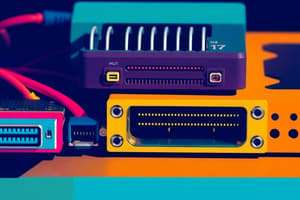Podcast
Questions and Answers
Which of the following is NOT considered a primary user interaction peripheral?
Which of the following is NOT considered a primary user interaction peripheral?
- CPU (correct)
- Keyboard
- Mouse
- Monitor
In which computer generation did the use of integrated circuits become fundamental?
In which computer generation did the use of integrated circuits become fundamental?
- Second generation
- Fourth generation
- Third generation (correct)
- First generation
Before electronic computers, what was the primary application of devices like the abacus and slide rule?
Before electronic computers, what was the primary application of devices like the abacus and slide rule?
- Online Communications
- Complex Graphics
- Scientific calculations (correct)
- Data Storage
Which of these is primarily responsible for executing instructions within a computer system?
Which of these is primarily responsible for executing instructions within a computer system?
Which action is MOST directly associated with the use of a mouse in computing?
Which action is MOST directly associated with the use of a mouse in computing?
Which of the following best describes the primary function of a computer monitor?
Which of the following best describes the primary function of a computer monitor?
What is the main purpose of the computer's system unit (case)?
What is the main purpose of the computer's system unit (case)?
Which input device is primarily used for typing text and commands into a computer?
Which input device is primarily used for typing text and commands into a computer?
What technology was primarily used in first-generation computers like ENIAC and UNIVAC?
What technology was primarily used in first-generation computers like ENIAC and UNIVAC?
Which of the following is a key characteristic of second-generation computers?
Which of the following is a key characteristic of second-generation computers?
What significant advancement characterized third-generation computers?
What significant advancement characterized third-generation computers?
Which component is considered the heart of modern computers, introduced in fourth-generation technology?
Which component is considered the heart of modern computers, introduced in fourth-generation technology?
What is the primary characteristic of the ongoing research in fifth-generation computers?
What is the primary characteristic of the ongoing research in fifth-generation computers?
Flashcards
What is the CPU?
What is the CPU?
The central processing unit (CPU) is the brain of a computer, responsible for interpreting and executing instructions. It processes data, performs calculations, and manages the overall operations of the computer.
What is an input device?
What is an input device?
An input device allows users to enter data and instructions into a computer. Examples include keyboards, mice, and scanners.
What were the first two generations of computers known for?
What were the first two generations of computers known for?
The first generation of computers used vacuum tubes, which were bulky and inefficient. Second-generation computers replaced vacuum tubes with transistors, leading to smaller and faster machines.
What is the system unit?
What is the system unit?
Signup and view all the flashcards
What is the function of a monitor?
What is the function of a monitor?
Signup and view all the flashcards
Monitor
Monitor
Signup and view all the flashcards
Keyboard
Keyboard
Signup and view all the flashcards
Mouse
Mouse
Signup and view all the flashcards
System Unit
System Unit
Signup and view all the flashcards
Peripheral Devices
Peripheral Devices
Signup and view all the flashcards
Personal Computing
Personal Computing
Signup and view all the flashcards
Early Computing Devices
Early Computing Devices
Signup and view all the flashcards
First-Generation Computers
First-Generation Computers
Signup and view all the flashcards
Study Notes
Basic Parts of a Computer
- Monitor: The primary output device, displaying text, images, and video. Types include CRT, LCD, LED, and OLED, each with varying resolutions and refresh rates impacting image quality.
- Keyboard: The primary input device, used to type text, commands, and interact with the computer. Layouts like QWERTY and Dvorak exist, each affecting typing speed.
- Mouse: A pointing device used to control the cursor on the screen. Types include optical and laser mice, functioning differently.
- System Unit (Case): Houses internal components (motherboard, CPU, RAM, hard drive, power supply). The case protects components and provides a structure for cabling. Different form factors (tower, desktop, mini-tower) affect space requirements.
- Peripheral Devices: Items working alongside main components; examples include printers, scanners, and webcams, enhancing computer functionality.
Evolution and History of Computers
- Early Computing Devices: Precursors like the abacus and slide rule performed basic calculations.
- First-Generation Computers (Vacuum Tubes): ENIAC and UNIVAC were large and unreliable machines using vacuum tubes for processing. Primarily used for scientific and military applications.
- Second-Generation Computers (Transistors): Smaller, faster, and more reliable than first-generation computers. Transistors replaced bulky vacuum tubes.
- Third-Generation Computers (Integrated Circuits): Introduced integrated circuits (ICs) to miniaturize components, making computers faster and more affordable. Microprocessor invention was key.
- Fourth-Generation Computers (Microprocessors): The microprocessor, a centralized processing unit, is the heart of modern computers. Personal computers, like Apple and IBM models, became mainstream.
- Fifth-Generation Computers (AI): Research into artificial intelligence and parallel processing is ongoing, aiming to develop computers with cognitive abilities akin to humans. Future computing focuses on advanced processing, miniaturization, and efficiency.
- Personal Computing: The shift from large, mainframe computers to personal use profoundly impacted society and technology evolution.
- Software Development: The creation of software and operating systems continuously enhances computer functionality alongside hardware advancements.
Quiz - Introduction to Computers
-
Multiple Choice:
-
Which device is primarily used for displaying information? a) Keyboard b) Mouse c) Monitor d) System Unit Correct answer: c) Monitor
-
What is a key component of the system unit, responsible for executing instructions? a) Monitor b) Keyboard c) CPU d) Printer Correct answer: c) CPU
-
Early computing devices like the abacus and slide rule were used for what purpose? a) Entertainment b) Scientific calculations c) Personal use d) All of the above Correct answer: b) Scientific calculations
-
Which generation of computers used integrated circuits? a) First b) Second c) Third d) Fourth Correct answer: c) Third
-
What is the main function of a mouse? a) To type text b) To point and click c) To display output d) To print documents Correct answer: b) To point and click
-
-
Short Answer:
-
Briefly describe the role of the system unit in a computer. The system unit houses the internal components, protecting them and providing a structure for cabling.
-
List two input devices that are commonly used. Keyboard and Mouse
-
-
True or False:
-
The fifth-generation of computers focuses on artificial intelligence. True
-
Personal computers were always widely accessible. False
-
Studying That Suits You
Use AI to generate personalized quizzes and flashcards to suit your learning preferences.




